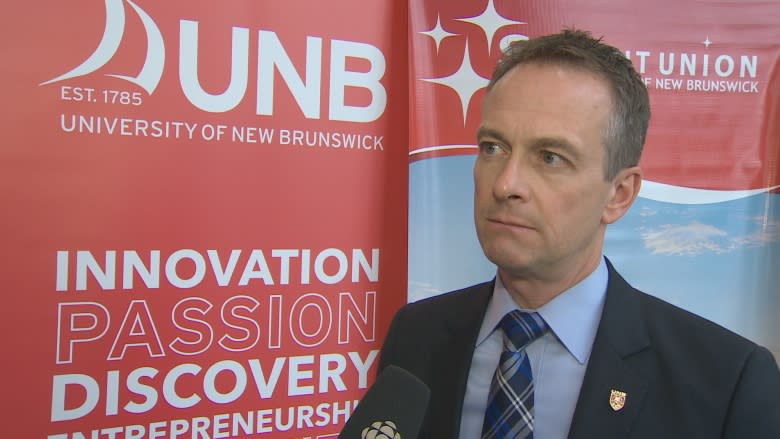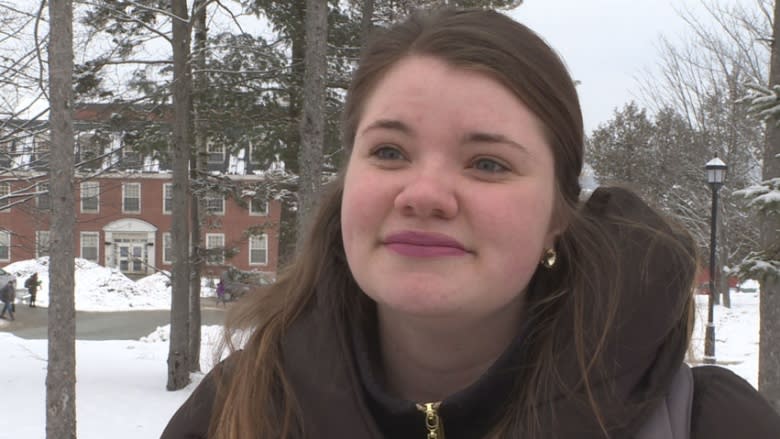20% of UNB Fredericton students surveyed report being sexually assaulted
Twenty-one cent per cent of University of New Brunswick Fredericton students who took part in a survey say they have been sexually assaulted since arriving at the campus, the university says.
That's about 252 of the approximately 1,200 students who completed the anonymous online Sexual Assault Climate Survey, launched in the fall of 2015. Sixty-six per cent of the survey respondents were female.
The rate is "consistent with" the findings of surveys conducted at other universities across North America, including those released earlier this week by francophone universities in Quebec, according to the researchers.
"This survey shows us that we still have work to do," George MacLean, vice-president academic for the campus, said in a statement.
The UNB Student Union described some of information revealed by the survey as "frightening."
"The release of this information is incredibly important because it allows students to understand that sexual assault does happen at UNB," Katie Beers, vice-president external, said in a statement.
Mixed reactions
Some of the students CBC News spoke to on Thursday were shocked by the findings.
"That's very surprising," said Kieran Delaney. "Not good."
"It's a lot higher than I would have expected," said Cody Hickey Court.
"It's definitely something that should be thought of as a problem and should be fixed because to me it isn't right and it shouldn't happen."
'Common trend'
Kirstin Duffley agreed the numbers are high.
"But as we've seen in the States and across Canada, it seems to be a common trend. Unfortunately that is the case."
Duffley said she is encouraged that UNB has launched a sexual assault policy.
"So they are starting to try to change that, which is great.
"And I think it's great that they're acknowledging those numbers because some schools try to just hide it, which is the exact opposite thing that you'd want to do."
"Definitely more should be done because it should be zero. So they're on the right track, but they need to keep pushing."
'It's horrible'
Laura Hoffe described the numbers as "strikingly high," but "not unheard of — and it's horrible."
She suspects the actual numbers are even higher because "a lot of people don't report it."
"People don't like reporting it," she said. "There's still a stigma attached to it," she said.
"A lot of people don't know what constitutes a sexual assault, so that's a big issue as well."
Some of the other survey findings include:
- In more than 60 per cent of the reported sexual assaults, both the victim and the perpetrator had been drinking alcohol.
- 90 per cent of sexual assaults occurred between two people who knew each other.
- 53 per cent of respondents said they wouldn't know how to get help from the university if they were sexually assaulted.
- 82 per cent of respondents feel safe on campus.
- "Many" students endorse one or more myths about sexual assault, such as rape accusations often being used as a way to get back at men.
- Thirty-four per cent of respondents said they experienced some type of non-consensual sexual activity before attending UNB.
#BreakTheSilence campaign
The student union, in partnership with the university, has launched a poster campaign called #BreakTheSilence.
It's aimed at removing the stigma surrounding the discussion of sexualized violence and working to create an environment where sexual violence is not tolerated.
The survey was intended to give administrators a better understanding of both attitudes toward, and experiences of, sexual violence among students at UNB Fredericton.
"Too much of the emphasis in media stories about campus sexual assault over the past two years has been on rates of sexual assaults reported to university authorities," said Dr. Rice Fuller, senior director of health and wellness for UNB.
The reported incidents represent only "a tiny fraction of the actual number of sexual assaults that occur," said Fuller, who developed the survey with Dr. Lucia O'Sullivan and PhD graduate student Charlene Belu.
"These results provide us with a clear picture of the current situation on our campus and how we can best address it."
Students were recruited for the survey through a letter of invitation issued from UNB's Student Services office to all part- and full-time students at the Fredericton campus.
The survey was conducted between October 2015 and February 2016.
Correction : A previous version of this story attributed the 'frightening' comment to UNB Student Union vice-president external Katie Beers. In fact, it was a statement issued by the student union.(Jan 20, 2017 3:16 PM)





